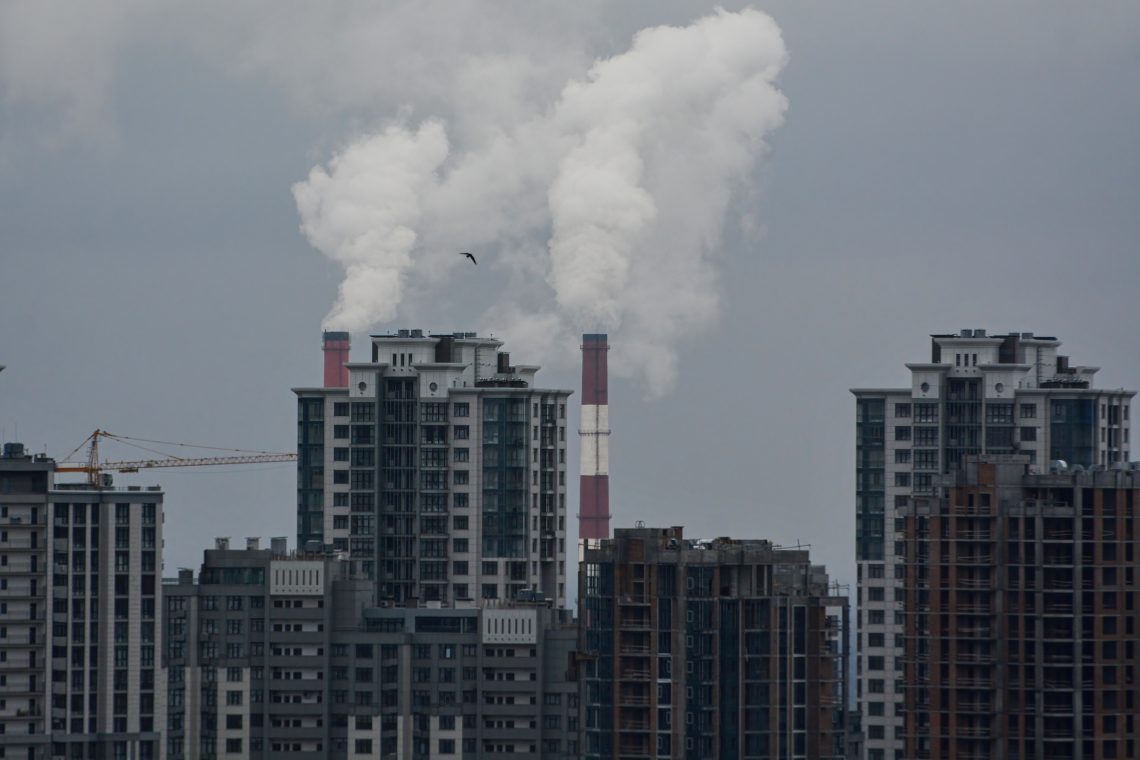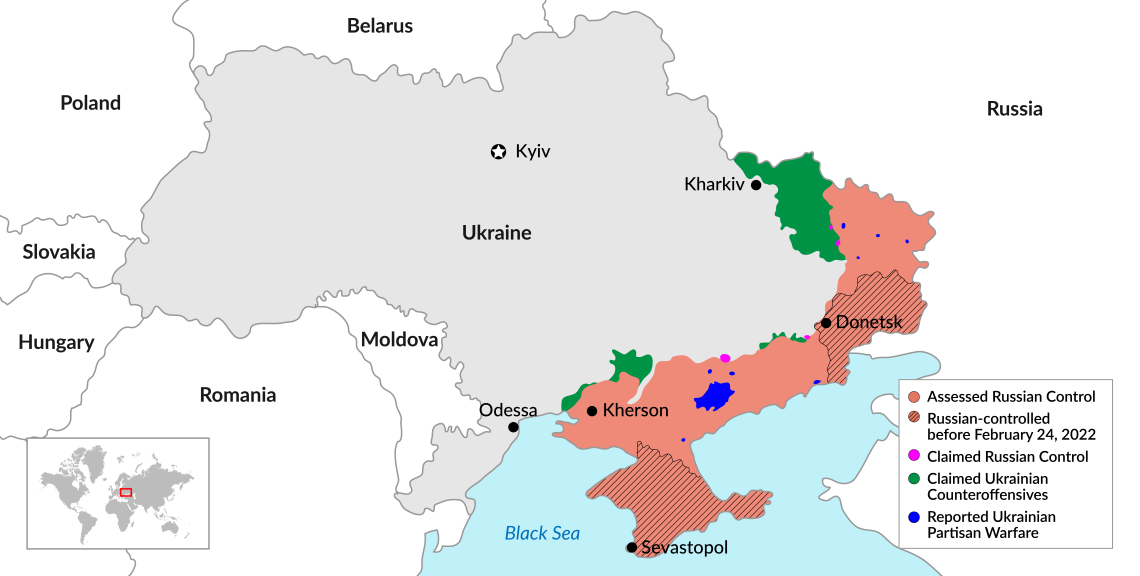Why compromise with Putin is not the solution in Ukraine
Russia’s atrocities in Ukraine should have convinced the West by now that surrendering to selfish energy interests and Kremlin nuclear blackmail will have horrible consequences.

In a nutshell
- Ukrainians won’t surrender the fight because their survival is at stake
- Allowing Russia to keep Ukrainian territories legitimizes the use of force
- The West should help Ukraine bring a quick end to the war on its terms
Thinking about postwar scenarios in Ukraine today may seem premature amid an ongoing war, but it is not. Indeed, postwar development will be determined by how the war continues and, above all, how it ends.
I have followed the situation in Ukraine for many years, having lived and worked in Kyiv between 2015 and 2020. The West still does not fully understand the underlying emotion that has gripped this hard-pressed country ever since 2014. This emotion is the main reason why Russian President Vladimir Putin’s plans for a quick and successful war did not materialize. It is also why the Russian president may well lose the war and even those parts of Ukraine that he seized in 2014 through military force.
This misunderstanding of how Ukrainians think and what they feel was particularly evident during the first months of the war. Several Western leaders, notably German Chancellor Olaf Scholz and French President Emmanuel Macron, spoke of the need to find a peaceful solution, one that would allow Mr. Putin to save face. Outwardly, they then abandoned this stance, as shown by two examples: Firstly, by granting European Union candidate status to Ukraine and Moldova in June this year; secondly, by repeated assurances that the possible terms of an end to the war must be decided mainly by the Ukrainians themselves.
The question remains to what extent this change of attitude is based on the internal convictions of Western leaders and to what extent it is due to the pressure of domestic public opinion in Western countries, especially after the revelations of atrocities and war crimes committed by the Russian army in Ukraine. The persistent bombing of civilian targets, the killing of defenseless people, including children, and Russia’s direct threat to the energy security of EU countries are hardening attitudes.
Energy prices and nuclear threats
The new impetus for a bad compromise may now come from two sources. The first is the unwillingness of people in the rich countries of the West to bear the cost of cutting themselves off from Russian hydrocarbons. These are not only direct, in the form of higher electricity, heat and gas prices for households, but also indirect, in the form of overall higher inflation, lower growth, the potential collapse of part of the economy and so on.
The second impulse may be even stronger. It stems from the fear that Vladimir Putin, cornered and losing the war, may use nuclear weapons not only against Ukraine but also against NATO and EU countries. This possibility is not out of the question. But it would be a big and fatal mistake on Mr. Putin’s part. Yet, he has already made so many mistakes in recent years, and in recent months particularly, that this one cannot be ruled out either. Still, the West cannot succumb to fear and blackmail. The only sensible strategy is to act as if President Putin is bluffing, but at the same time prepare for the possibility that he might use nuclear weapons.
Ukraine neither can nor will voluntarily give up any of its territories, including Crimea and those parts of Donbas annexed and controlled by Russia since 2014.
Let us explore why a compromise (forced, for example, by nuclear blackmail) would be a bad solution or would be no solution at all.
First, it is important to realize that it would set a very dangerous precedent from a global perspective. It would legitimize changing borders by force or the threat of force. The direct and indirect consequences of such a precedent would be devastating not only in geopolitical and military terms but in all other respects as well. It would lead to a meteoric rise in arms spending and a literal race to acquire nuclear weapons by more countries. The world would return to the days when Stanley Kubrick’s saying that “The great nations have always acted like gangsters, and the small nations like prostitutes” was true.
From the point of view of Ukraine and Central and Eastern Europe, such an end to the war would not solve the problems, but more than likely make them worse.
Ukraine neither can nor will voluntarily give up any of its territories, including Crimea and those parts of Donbas annexed and controlled by Russia since 2014. If Ukraine were forced to do so (e.g., by canceling or reducing military and economic aid from the West), the war could perhaps be ended by some compromise. However, compromise under circumstances of capitulation would endanger other countries of the former Soviet bloc. It would also create such a degree of instability and tension in Ukraine that it would make it impossible for the nation to integrate into the EU, carry out the necessary reforms, and rebuild its war-torn country. The source of instability and conflict would then no longer be just Russia, but Ukraine as well.

How Ukraine has changed
It is important to remember how Ukraine changed after 2014 and even more so after February 24, 2022.
Until 2014, Ukraine was a geopolitically divided country. About half of the population (generally in the east and south, among older, less educated, Russian-speaking and rural voters) favored cooperation with Russia. The other half (generally in the west and center, among younger, more educated, urban and Ukrainian-speaking voters) favored belonging to the West (EU and NATO).
After 2014, following the Kremlin’s illegal annexation of Crimea and the seizure of parts of Donbas by Russian forces and their proxies, there was a shift toward a significant, but still not overwhelming, pro-Western orientation. Following Russia’s unleashing of full-scale war against Ukraine in February this year, this support for the country’s pro-Western orientation has become unequivocal.
This geopolitical change has thus come about primarily thanks to Mr. Putin. It will paradoxically (but also fairly) be the main reason why the Russian autocrat is unlikely to win Ukraine and likely to lose Russia. Russian aggression has united and mobilized Ukrainian society. It has increased the level of support for the Western geopolitical direction of the country, increased people’s trust in the country’s political leadership, and even increased confidence in the country’s current direction. A few figures illustrate what kind of change we are talking about.
In July 2022, support for joining the EU and NATO stood at 91 percent and 85 percent respectively, while before the war, in December 2021, it was only 58 percent (EU) and 48 percent (NATO). In 2012, 20 percent of Ukrainians were in favor of joining NATO (and 70 percent were against it), and about half of the population was in favor of joining the EU.
While in December 2021 President Volodymyr Zelenskiy was trusted by 38 percent of people (and distrusted by 61 percent), in June 2022 his trust was at 85 percent. While in January 2021 as many as 53.1 percent of Ukrainians did not believe that President Zelenskiy could handle the role of commander in chief of the armed forces in the event of a war with Russia, in April 2022, 78 percent of respondents were satisfied with his performance in this capacity (2 percent were dissatisfied, 10 percent had no clear opinion).
In December 2021, more than two-thirds (67 percent) of Ukrainians thought the country was heading in the wrong direction and less than a quarter (24 percent) thought the country was heading in the right direction. After the outbreak of the war, in March-July 2022, the share of those who considered the country’s direction to be right ranged between 73 percent and 80 percent.
The best response is to help the Ukrainians as much as possible, as quickly and as effectively as possible, both militarily and economically.
In August of this year, 87 percent of Ukrainians were opposed to any territorial concessions to Russia, a proportion that has been rising in recent months and weeks, and is relatively equal in all regions, including the south and east where, historically, an affinity for Russia has always been higher.
It is far from being just about numbers. Even between 2014 and 2022, no politician in Ukraine could afford to admit that the return of Crimea was unrealistic or that Ukraine should give up those parts of Donbas controlled by Russian-financed separatists. Even though almost everyone was aware that regaining Crimea in the foreseeable future was improbable and that the ongoing conflict in eastern Ukraine was a burden that was destabilizing the country, hindering investment inflows and threatening its integration ambitions.
Accepting the loss of this territory would not only legitimize Russian aggression and set a dangerous precedent. It would also dishonor the thousands of Ukrainian soldiers and civilians who died because of Russian aggression in this territory between 2014 and 2022. And we are talking about the situation before February 2022. Can anyone imagine that they would have to give up territory after all that has happened since February 24, 2022? After all the human and material sacrifices and losses?
Facts & figures
Russia’s invasion of Ukraine

The power of veterans
There is one more important thing – the war veterans. Their number was negligible compared to the present before 2022, but their influence was very strong. At the beginning of 2017, a few dozen, at most hundreds of them, decided to block the dubious flow of goods between the Russian-held territories and those controlled by the Ukrainian government. They pointed out that these were dirty, bloody deals. The government was left with no choice but to block all (even legal) flows of goods, but also to a large extent the movement of people between Ukraine and these territories. Even then it was unthinkable to oppose the veterans and use the authority of the state against them.
Can we imagine what influence and power veterans will hold after this war is over? And how would a significant number of them feel about a compromise that would (from their point of view) mean that they had fought in vain? That their comrades had died or been maimed needlessly? With such emotions, can we imagine the number of weapons left behind after the war, not only among veterans but also among ordinary citizens, and what that might mean?
The best strategy for the West is to understand and accept these emotions and this situation. The best response is to help the Ukrainians as much as possible, as quickly and as effectively as possible, both militarily and economically, to drive the Russians out of their country and to restore their independence and territorial integrity within the pre-2014 borders.
Even after achieving such an end to the war, it will be a huge challenge for Ukraine to manage three difficult processes at once – reforms, integration into the EU and the postwar reconstruction of the country and the economy. Still, this challenge will be manageable under these circumstances. However, if the war ends in a compromise that even partially legitimizes Russian aggression, then successfully managing the reform, integration, and reconstruction visions will be nearly impossible.








